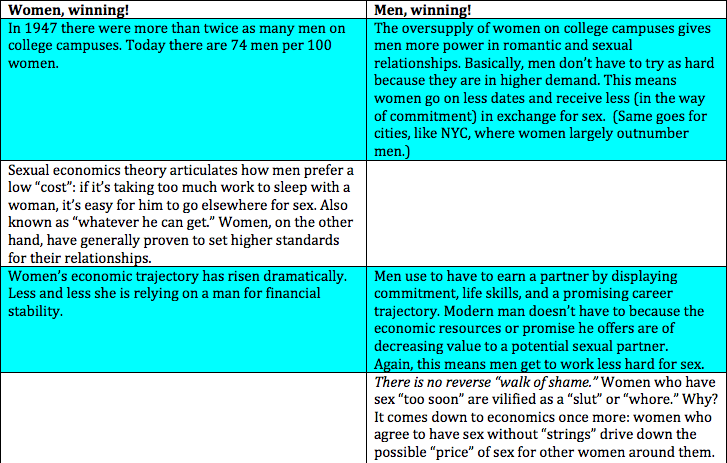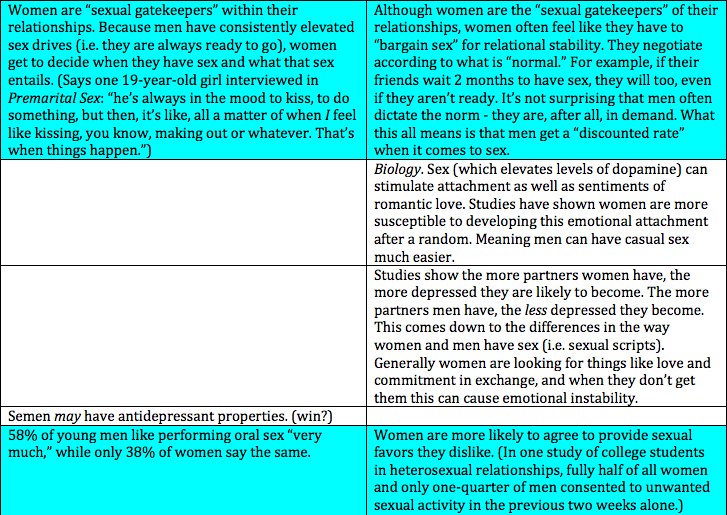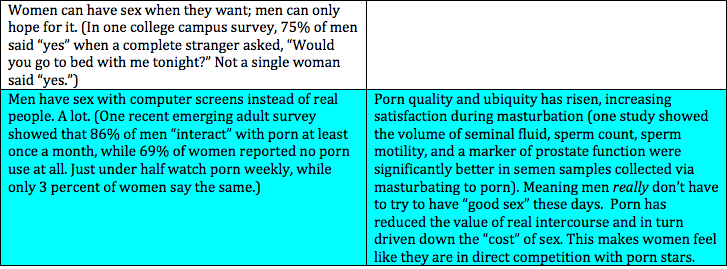By Michelle Rafferty
As most of you probably know by now, there’s a new stage in life – emerging adulthood, or for the purposes of this post, the unmarried young adult. Marriage is getting pushed off (26 is now the average age for women, 28 for men) which means…more premarital sex than ever!
According to sociologists, emerging adults are all part of a sexual market in which the “cost” of sex for men and women in heterosexual relationships is pretty different. Out of this disparity has risen the theory of “sexual economics,” which I recently read up on in Premarital Sex in America: How Young Americans Meet, Mate, and Think about Marrying. At first glance women appeared to be the clear losers in this market. See this passage:
Sexual economics theory would argue that sex is about acquiring valued “resources” at least as much as it is about seeking pleasure. When most people think of women trading sex for resources, they think of prostitution and money as the terms of exchange. But this theory encourages us to think far more broadly about the resources that the average woman values and attempts to acquire in return for sex – things like love, attention, status, self-esteem, affection, commitment, and feelings of emotional union. Within many emerging adults’ relationships, orgasms are not often traded equally.
Basically, the sexual economics theory says that while women and men are doing the same thing during sex, socially they are doing two different things. Women can and do enjoy sex, but they also have an agenda, while men…just want to have sex. Which to me just seemed, well, sad. Hadn’t women all finally agreed that a man can’t ever make you happy, only you can? But the more I read up on the theory of sexual economics, the less cut-and-dry it became. Women might use sex to get commitment, but they’re also getting things like advanced degrees and independent financial stability - which also play a role in this new sexual economy. This led me to ask: are men really the clear winners in this game? I scoured the countless studies and interviews in Premartial Sex in America and came up with the following chart to sort all the data out.
Wins in the Emerging Adult Sexual Market by Gender




Tally:
Women &
Recently the New York Times published a major story featuring Jeffrey Arnett’s research on “emerging adulthood,” his term for the age period from 18 to 29. The article received tremendous attention (boosting it to the position of top emailed story) and Arnett was soon asked to appear on the Today Show, among other major media outlets around the world. In the original post below, he expands on the ideas previously presented and responds to stereotypes about emerging adults.
By Jeffrey Arnett
How do you know when you’ve reached adulthood? This is one of the first questions I asked when I began my research on people in their twenties, and it remains among the most fascinating to me. I expected that people would mostly respond in terms of the traditional transition events that take place for most people in the 18-29 age period: moving out of parents’ household, finishing education, marriage, and parenthood. To my surprise, none of these transition events turned out to hold much importance as markers of adulthood. In fact, finishing education, marriage, and having at least one child have consistently ended up near the bottom in importance in the many surveys that I and others have done in the United States and around the world over the past decade.
Consistently, across countries, ethnic groups, gender, and social classes, the “Big Three” criteria for reaching adulthood are these: 1) Accept responsibility for yourself, 2) Make independent decisions, 3) Become financially independent.
What the Big Three have in common is that they all denote self-sufficiency. For emerging adults, adulthood means learning to stand on your own as a self-sufficient person. Only when you have attained self-sufficiency are you ready to take on the obligations of marriage and parenthood. Because the Big Three all occur gradually rather than as one-time events, most emerging adults feel in-between until at least their mid-twenties, on the way to adulthood but not there yet.
There are negative stereotypes that have sprung up with regard to emerging adults: that they are lazy, spoiled, selfish, and never want to grow up. These stereotypes are common and extremely unfair. Lazy? Have you noticed lately who is pouring your coffee, working the retail counter, mowing the lawns? It’s mostly emerging adults who are doing the crummy, low-paying, no-benefits jobs older adults try to avoid. Emerging adults often hold one or more of these jobs and combining them with going to school as they try to work their way up to something better. Spoiled and selfish? Who is it that is applying in record numbers to Teach for America, Americorps, and the Peace Corps, among other volunteer organizations? Not their Baby-Boomer critics, but emerging adults. Never want to grow up? By age 30 most people are married, have at least one child, and are committed to a stable career path. Why begrudge them the freedom of their twenties to try to make the best possible adult lives for themselves, and to have fun and adventures that they will not be able to have later?
Whatever older adults think of it, emerging adulthood is here to stay as a stage of the life course. Instead of tearing them down, as parents and as a society we should be building them up and giving them the support they need to enjoy their twenties and have a successful entry into the responsibilities of adult life.
Jeffrey Jensen Arnett, Ph.D. is a Research Professor in the Department of Psychology at
0 Comments on 20-somethings: NOT lazy, spoiled, or selfish as of 1/1/1900





